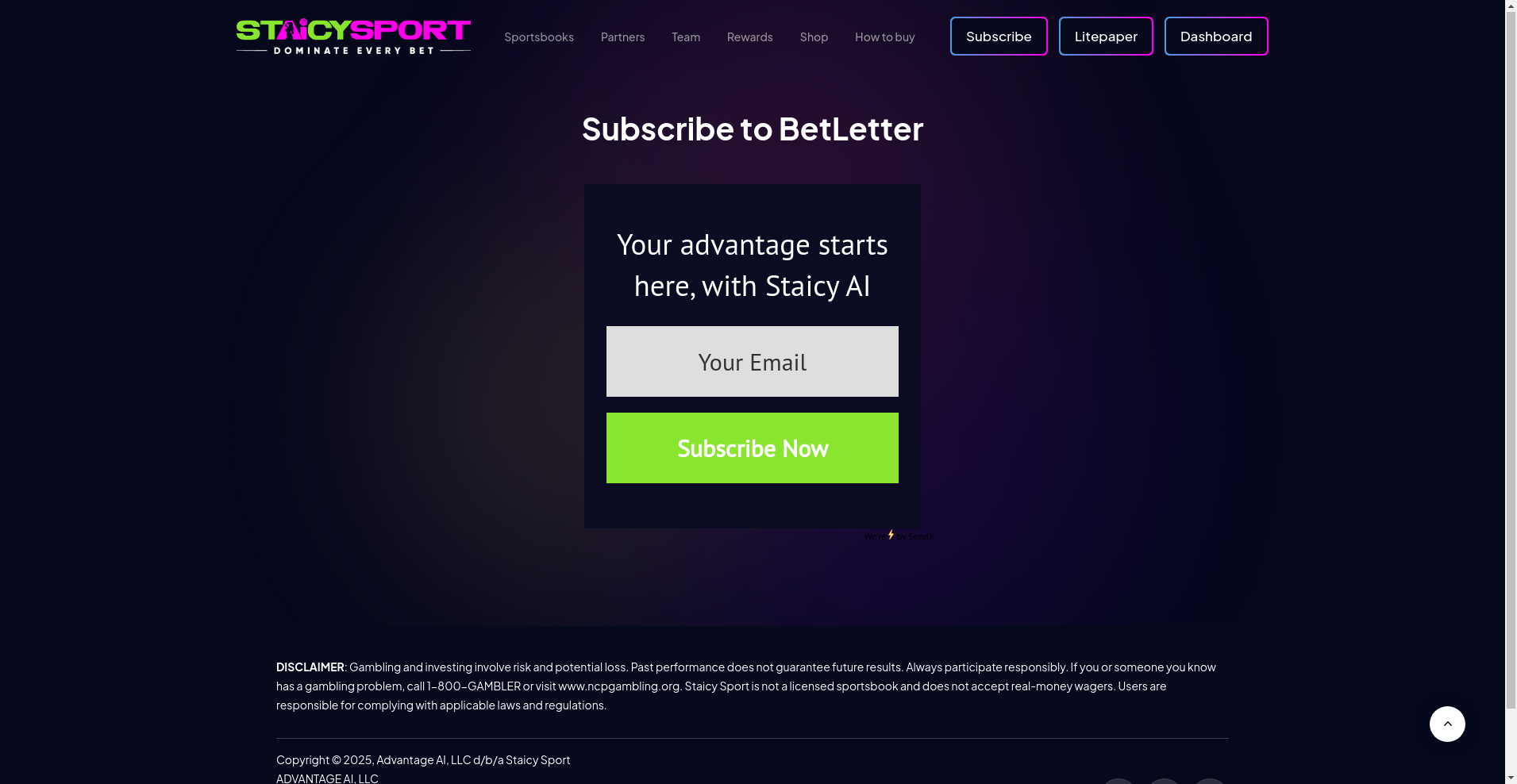SPORT Review: Scam or Legit Crypto? Uncovering All The Red Flags

What Exactly Is SPORT?
SPORT claims to be a groundbreaking project combining AI-driven sports predictions with a native token ecosystem. Marketed as a revolutionary platform purportedly to transform sports betting through advanced algorithms, it promises users real-time insights, predictive analytics, and a slew of membership tiers offering various features. Additionally, SPORT introduces a unique token, $SPORT, on the BASE blockchain, with ambitious plans for growth and community engagement.
However, as with many crypto projects touting AI and community rewards, skepticism is warranted. This investigation delves into the available evidence, audit reports, and legal disclosures to determine whether SPORT is a promising opportunity or just another crypto scam.

Who Is The Team Behind SPORT?
Based on publicly available data, the team behind SPORT appears to operate under the umbrella of Advantage AI, LLC, a U.S.-based company with a registered mailing address in Idaho. The project lists a number of high-profile team members, including roles like CEO, CTO, chief marketers, and analysts. Notably, these individuals have names that are common or appear to be pseudonyms such as "Dr. Evil of Crypto," raising questions about their transparency and credibility.
Key points about their roadmap and vision include:
- Partnership with Eagle AI Labs, positioning themselves as leveraging cutting-edge AI technology.
- Plans to expand coverage to major sports including NFL, NBA, UFC, and soccer over multiple quarters.
- Development milestones such as dashboard upgrades, predictive tools, and community rewards.
- A roadmap that emphasizes technological innovation but lacks specific technical or team background details.
- Goals of becoming "the most accurate sports prediction model," which sounds overly ambitious without independent validation.
While the team claims to have a significant foundation and partnerships, the lack of transparent leadership profiles, independent audits of their AI tech, or verifiable milestones in blockchain development diminishes their credibility. In the highly competitive and often shady landscape of crypto sports platforms, anonymity or pseudonymity is a red flag.

SPORT Security Audit: A Deep Dive into the Code
The provided audit information shows that SPORT underwent a Cyberscope audit, a reputable security review, especially for smart contracts. The audit was completed on March 16, 2025, with a high priority on security, given the identification of "high criticality." The overall internal assessment suggests a solid security posture, with a security score percentile of approximately 94%, indicating strong standards were likely followed.
- The contract is deployed on the BASE network; however, there is no publicly available detailed report or third-party audit summary beyond the basic assessment.
- The audit mentions a "high criticality" concern, but without details, it's impossible to verify whether vulnerabilities exist or have been mitigated.
- Decentralization score is around 52%, indicating a moderate level of centralization—possibly a concern for those seeking a fully community-governed project.
Overall, the audit gives a preliminary indication of technical competence but nothing that confirms the platform's safety from hacking or exploits. Without in-depth review reports or third-party attestations, the risk remains uncertain, especially given the inherent vulnerabilities associated with DeFi projects.
SPORT Tokenomics: A Fair System or a Trap?
The $SPORT token has a total supply of 105 million tokens, with distribution as follows: 65% to the community, 15% marketing and KOLs, 10% development, and 10% allocated to the team. While these figures are typical for many crypto projects, key concerns lie in their utility and control mechanisms.
- Token utility appears centered around staking, tiers, and rewards; specifics on governance rights or dividends are vague.
- Significant team allocation (10%) coupled with vague lock-up or vesting terms can lead to sudden dumps, especially if the team lacks transparency.
- The project emphasizes staking for participation, which can be exploited by large holders to manipulate the rewards or market price.
- High inflation risk exists if the project continues to mint or redistribute tokens without clear deflationary mechanisms.
This structure leaves open the possibility of a token dump, especially if early investors or team members decide to cash out, creating instability and potential losses for new investors.
Is SPORT a Ghost Town? Checking for Real Activity
From the available summaries, SPORT's development activity appears minimal beyond marketing and community-building. The project lists progress milestones but provides no concrete evidence of ongoing development, code commits, or updates from independent repositories. Their social media remains active, with Telegram and Twitter followers, but engagement levels are modest relative to the hype.
The platform features a dashboard, subscription service, and merchandise store, indicating some operational side, but no verifiable app or live prediction engine is openly accessible. Community scores and trust audits show modest activity, and the lack of additional independent reviews or third-party audits suggests that the project may be more focused on hype and fundraising than actual product delivery.
This pattern aligns with many crypto scams—where projects stay static post-launch, relying on new investors to sustain momentum or hype up non-existent features.
What SPORT's Legal Documents Are Hiding
- The terms explicitly state that SPORT is not a licensed sportsbook and does not accept real-money wagers. This is a critical disclaimer that points towards the platform being for entertainment or predictive analysis rather than actual betting.
- Clauses about "user responsibility," "regulatory compliance," and "responsible gambling" are standard but serve to absolve the operators of liability, shifting risk entirely onto users.
- The company’s legal address and a strong emphasis on disclaimers suggest a focus on distancing itself from regulators—a common trait in scam projects to avoid legal scrutiny.
- Limited transparency regarding privacy policies or audits on their terms suggests they want to avoid detailed scrutiny, especially regarding data handling or user security.
Overall, while the legal disclaimers lean towards protecting the operators, they also reveal that the platform operates in a gray legal zone, raising red flags for potential investors looking for reliable, regulated services.
Final Verdict: Should You Risk Investing in SPORT?
Based on observed evidence, SPORT presents itself as an ambitious AI-powered sports prediction and rewards platform but falls short of establishing credible transparency, meaningful development activity, or verifiable third-party audits. Its high centralization score, vague team background, and minimal real-world activity indicate that it is likely a project driven more by hype than substance.
While some security measures seem acceptable, the overall presentation, legal disclaimers, and lack of concrete progress highlight substantial risks. Investors should be cautious, as opportunities like these frequently turn into scams or highly volatile assets with potential for significant loss.
Positives Points
- A seemingly comprehensive audit with a high security score percentile
- Clear tokenomics structure with community-focused distribution
- Active social media and community channels indicating some level of engagement
- Legal disclaimers emphasizing responsible participation and transparency about licensing
Major Red Flags
- Anonymous or pseudonymous team members lacking verifiable backgrounds
- Minimal real-world activity or independent development updates
- Vague claims about AI accuracy without external validation or third-party audits
- Moderate decentralization and potential token dump risks from team and early investors
- Legal disclaimers suggest a platform operating in a regulatory gray area, with no licensing
Given these factors, readers are advised to exercise extreme caution and conduct thorough crypto due diligence before considering any investment or participation in SPORT or any similar project. Remember that in the volatile crypto landscape, transparency and verified progress are key indicators of legitimacy, which SPORT currently lacks.

Emily Davis
Digital Forensics Investigator
Digital forensics investigator. I follow the money on the blockchain to uncover the truth behind crypto scams and exploits. Every transaction tells a story—I'm here to make sure it's heard.
Similar Projects
-
TG.Bet
Crypto Project Review & Scam Checker: Is TG.Bet a Legitimate Crypto Gaming Platform?
-
The Real Lifestyle
The Real Lifestyle ($TRLX) Review: Legitimacy & Risks Explored
-
LETSTOP
Review of LETSTOP: Crypto Project Scam Checker & Risk Analysis
-
Dracula Token
Dracula Token Review: Scam Check & Legitimacy Analysis
-
Tranche Finance
Tranche Finance Review: Scam Check & Legitimacy Analysis